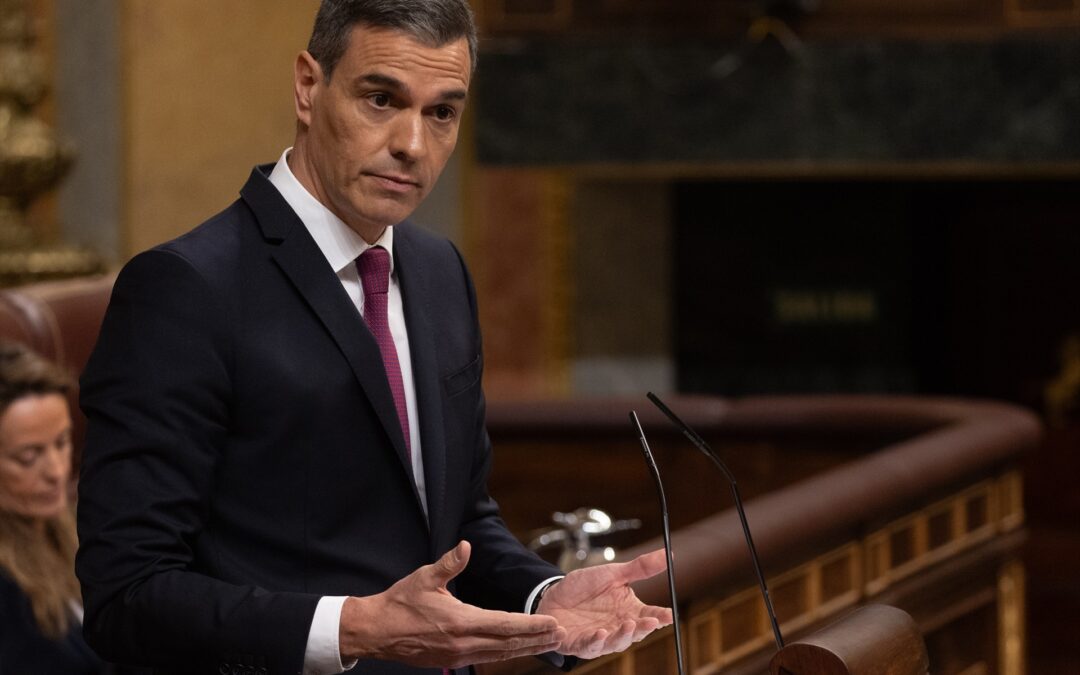Madrid – The President of the Government of Spain, Pedro Sánchez, has formally announced the recognition of the Palestinian State, which will be approved today by the Council of Ministers, and has emphasized that this “historic decision” is not against Israel, a “friendly people”, but rather reflects the “rejection of Hamas”.
This step, taken alongside Ireland and Norway, makes Spain one of the 146 countries worldwide that have recognized Palestine as a state, including eleven members of the European Union.
In an official statement at the Palace of Moncloa, Sánchez stated that this is not a “decision against anyone”, least of all Israel, which is “a friendly people” that Spain respects, appreciates and with which it wants to have “the best possible relationship”, but it reflects the “total and categorical rejection of Hamas, a terrorist organization that is against the two-state solution”.
As he did last week in the Congress of Deputies when he announced the recognition date, Sánchez argued that “this is a historic decision with a single objective”, which is “to help Israelis and Palestinians achieve peace”.
In his view, recognizing Palestine “is not only a matter of historical justice with the legitimate aspirations of the Palestinian people”, but also “a pressing need” if peace is to be achieved, and “the only way to move forward” towards the two-state solution.
The Spanish President held that “the State of Palestine must be, first of all, viable, with the West Bank and Gaza connected by a corridor, and with East Jerusalem as its capital, unified under the legitimate government of the Palestinian National Authority”.
According to him, the vision of the government he heads “is fully aligned with the United Nations Security Council resolutions” and with the traditional EU position, which refers to the 1967 borders before the Six-Day War. Therefore, Spain will not recognize changes in the 1967 border lines that are not “agreed upon by the parties”.
From now on, he said, Spain will focus all efforts on “making the two-state solution a reality” and will support the Palestinian National Authority, its “new partner for peace”, in the reform process initiated by its new government. In addition, it will continue to promote cooperation with its “Arab partners, who are also working for peace and prosperity in the region”, with whom Spain will continue to join efforts for the holding of an international peace conference.
This statement coincides with the European Union’s decision to summon Israel in the framework of the Association Council to ensure compliance with the orders of the International Court of Justice (ICJ).
The block’s foreign ministers made this decision yesterday after Israel bombed a displaced persons camp in the Gaza region of Rafah despite the ICJ ordering it to end its military offensive.
According to the EU High Representative for Foreign Policy, Josep Borrell, the measure had the necessary unanimity to address the Gaza crisis and Tel Aviv’s obligations assumed in the Association Council or how to ensure the implementation of ICJ measures.
Likewise, the European block called on Israel to unblock funding to the Palestinian Authority, as well as to allow the activity of the United Nations Relief and Works Agency for Palestine Refugees in the Near East (UNRWA).
Last March, the same EU foreign ministers shelved the option of summoning Israel in the framework of the Association Council with the EU to review relations, as Spain and Ireland had requested a month earlier. At that time there was no support for the initiative by Madrid and Dublin to study whether there is a basis for reviewing relations with Israel under the association agreement.
After the meeting, Spain’s Foreign Minister, José Manuel Albares, supported the EU studying “the instruments at its disposal” to support international law and compliance with ICJ rulings, but insisted on reiterating the call for Israel to comply with ICJ orders. (May 27 and 28)
 go to the original language article
go to the original language article
